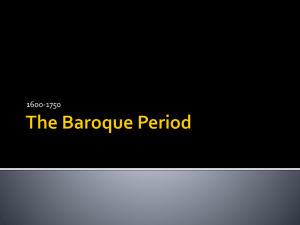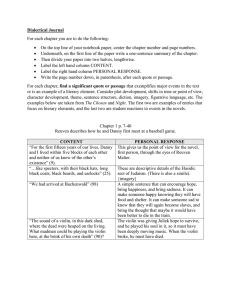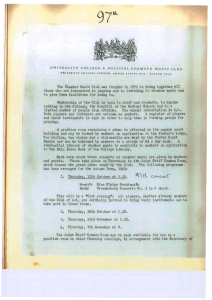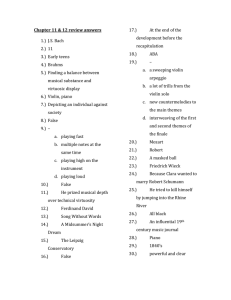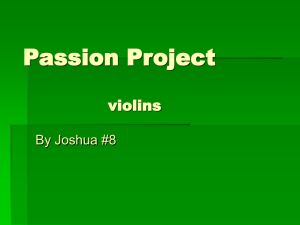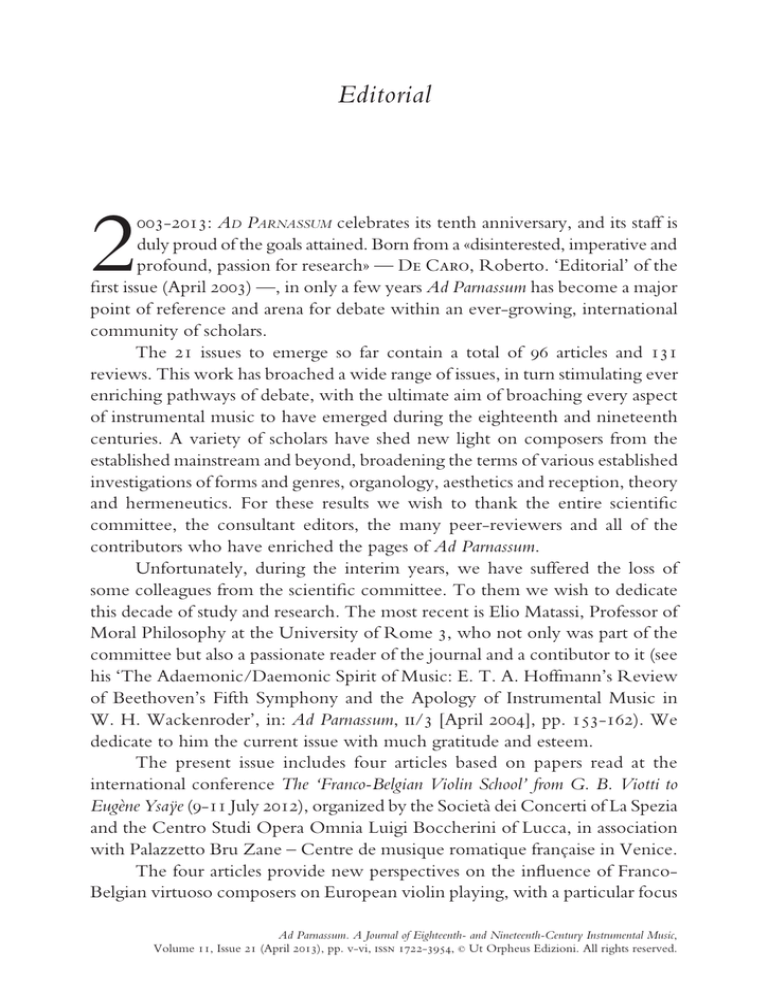
Editorial
2
003-2013: Ad Parnassum celebrates its tenth anniversary, and its staff is
duly proud of the goals attained. Born from a «disinterested, imperative and
profound, passion for research» — De Caro, Roberto. ‘Editorial’ of the
first issue (April 2003) —, in only a few years Ad Parnassum has become a major
point of reference and arena for debate within an ever-growing, international
community of scholars.
The 21 issues to emerge so far contain a total of 96 articles and 131
reviews. This work has broached a wide range of issues, in turn stimulating ever
enriching pathways of debate, with the ultimate aim of broaching every aspect
of instrumental music to have emerged during the eighteenth and nineteenth
centuries. A variety of scholars have shed new light on composers from the
established mainstream and beyond, broadening the terms of various established
investigations of forms and genres, organology, aesthetics and reception, theory
and hermeneutics. For these results we wish to thank the entire scientific
committee, the consultant editors, the many peer-reviewers and all of the
contributors who have enriched the pages of Ad Parnassum.
Unfortunately, during the interim years, we have suffered the loss of
some colleagues from the scientific committee. To them we wish to dedicate
this decade of study and research. The most recent is Elio Matassi, Professor of
Moral Philosophy at the University of Rome 3, who not only was part of the
committee but also a passionate reader of the journal and a contibutor to it (see
his ‘The Adaemonic/Daemonic Spirit of Music: E. T. A. Hoffmann’s Review
of Beethoven’s Fifth Symphony and the Apology of Instrumental Music in
W. H. Wackenroder’, in: Ad Parnassum, ii/3 [April 2004], pp. 153-162). We
dedicate to him the current issue with much gratitude and esteem.
The present issue includes four articles based on papers read at the
international conference The ‘Franco-Belgian Violin School’ from G. B. Viotti to
Eugène Ysaÿe (9-11 July 2012), organized by the Società dei Concerti of La Spezia
and the Centro Studi Opera Omnia Luigi Boccherini of Lucca, in association
with Palazzetto Bru Zane – Centre de musique romatique française in Venice.
The four articles provide new perspectives on the influence of FrancoBelgian virtuoso composers on European violin playing, with a particular focus
Ad Parnassum. A Journal of Eighteenth- and Nineteenth-Century Instrumental Music,
Volume 11, Issue 21 (April 2013), pp. v-vi, issn 1722-3954, © Ut Orpheus Edizioni. All rights reserved.
Editorial
on the bravura tradition and violin technique. Aspects investigated include «the
development of a ‘Franco-Belgian School’, via critical reception and the writings
of contemporary observers» (David Milsom); an overview of concert life in Paris
from 1822 to 1848, encompassing the evolution of the violin concerto (Étienne
Jardin); the aesthetics connected with the musical interpretation of French violin
treatises (Renata Suchowiejko); the orchestration of Paganini’s Violin Concertos
compared with the approaches taken by Franco-Italian composers of the earlyto-mid nineteenth-century (Rohan H. Stewart-MacDonald).
Ad Parnassum Editors
vi

